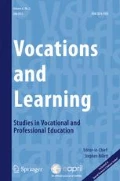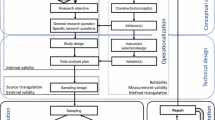Abstract
Practice-based research and supervising students’ research has become an important task for higher vocational institutes, including the teacher education departments. However, conducting practice-based research is not always common practice for a great number of teacher educators. Therefore, professional development activities are undertaken to support teacher educators in their new role as a researcher. This paper reports on one of those activities: a community of inquiry in which teacher educators conducted a collaborative research on a shared topic derived from their practices, in order to examine teacher educators’ professional development and to identify key characteristics for setting up such a community. All participants reported developments in practice-based research skills and knowledge, and developments regarding supervising students’ research. In addition, they reported on developments in their beliefs regarding research and on the topic under research. They also reported the impact of the community on other parts of their profession. Commitment, time, teacher educators as experienced researchers and completing the research stages are identified as key characteristics.
Similar content being viewed by others
References
Admiraal, W., Lockhorst, D., & Pol, J. v. d. (2012). An expert study of a descriptive model of teacher communities. Learning Environments Research, 15, 345–361.
Avalos, B. (2011). Teacher professional development in teaching and teacher education over ten years. Teaching and Teacher Education, 27(1), 10–20.
Association of Teacher Educators (ATE) (2008). Standards for Teacher Educators. http://www.ate1.org/pubs/Standards.cfm, retrieved March 2015.
Barak, J., Gidron, A., & Turniansky, B. (2010). Without stones there is no arch’: a study of professional development of teacher educators as a team. Professional Development in Education, 36, 275–287.
BERA (2014). The role of research in teacher education: reviewing the evidence. BERA: Interim report of the BERA-RSA inquiry. London.
Beauchamp, G., Clarke, L., Hulme M., & Murray, J. (2013). Policy and practice within the United Kingdom. Research and Teacher Education: The BERA-RSA Inquiry. Paper 1, https://www.bera.ac.uk/project/research-and-teacher-education.
Borg, S., & Alshumaimeri, Y. (2012). University teacher educators' research engagement: perspectives from Saudi Arabia. Teaching and Teacher Education, 28(3), 347–356.
Boyd, P., Harris, K., & Murray, J. ([2007] 2011). Becoming a Teacher Educator. Guidelines for the Induction of Newly Appointed Lecturers in Initial Teacher Education. Bristol: Higher Education Academy, Education Subject Centre.
Chetty, R., & Lubben, F. (2010). The scholarship of research in teacher education in a higher education institution in transition: issues of identity. Teaching and Teacher Education, 26(4), 813–820.
Christie, D., & Menter, I. (2009). Research capacity building in teacher education: Scottish collaborative approaches. Journal of Education for Teaching: International Research and Pedagogy, 35(4), 337–354.
Clarke, A. (2001). The recent landscape of teacher education: critical points and possible conjectures. Teaching and Teacher Education, 17, 599–611.
Clarke, D., & Hollingsworth, H. (2002). Elaborating a model of teacher professional growth. Teaching and Teacher Education, 18, 947–967.
Cochran-Smith, M. (2003). Learning and unlearning: the education of teacher educators. Teaching and Teacher Education, 19, 5–28.
Cochran-Smith, M. (2005). Teacher educators as researchers: multiple perspectives. Teaching and Teacher Education, 21, 219–225.
Cochran-Smith, M., & Lytle, S. (2009). Inquiry as stance. Practitioner research for the next generation. New York: Teacher College Press.
Cohen, L., Manion, L., & Morrison, K. (2000). Research methods in education. London: Routledge Falmer.
Dengerink, J. J., Lunenberg, M., & Kools, Q. (2015). What and how teacher educators prefer to learn. Journal of Education for Teaching: International Research and Pedagogy, 41(1), 78–96.
Erixon Arreman, I. (2008). The Process of Finding a Shape: stabilizing new research structures in Swedish teacher education, 2000–2007. European Educational Research Journal, 7 (2). 157–176. http://dx.doi.org/10.2304/eerj.2008.7.2.157.
European Commission (2013). Supporting teacher educators. EC: Brussels.
Earley, P., & Porritt, V. (2010). Effective practices in continuing professional development: lessons from schools. London: Institute of Education, University of London.
Furlong, J., & Oancea, A. (2007). Assessing quality in applied and practice-based research in education: continuing the debate. Research Papers in Education, 22(2), 115–118.
Gallagher, T., Griffin, S., Ciuffetelli-Parker, D., Kitchen, J., & Figg, C. (2011). Establishing and sustaining teacher educator professional development in a self-study community of practice: Pre-tenure teacher educators developing professionally. Teaching and Teacher Education, 27(5), 880–890.
Garrison, D.R., Anderson, T. & Archer, W. (2001). Critical thinking, cognitive presence, and computer conferencing in distance education. American Journal of Distance Education, 15(1), 7–23.
Gilroy, P., & McNamara, O. (2009). A critical history of research assessment in the United Kingdom and its post-1992 impact on education. Journal of Education for Teaching, 35(4), 321–335.
Goodwin, A. L., & Kosnik, C. (2013). Quality teacher educators = quality teachers? Conceptualizing essential domains of knowledge for those who teach teachers. Teacher Development, 17(3), 334–346.
Griffiths, V., Thompson, S., & Hryniewicz, L. (2010). Developing a research profile: mentoring and support for teacher educators. Professional Development in Education, 36(1–2), 245–262.
Grossman, P., Wineburg, S., & Woolworth, S. (2001). Toward a theory of teacher community. The Teachers College Record, 103, 942–1012.
Groundwater-Smith, S., & Mockler, M. (2007). Ethics in practitioner research: an issue of quality. Research Papers in Education, 22(2), 199–121.
Hadar, L., & Brody, D. (2010). From isolation to symphonic harmony: building a professional development community among teacher educators. Teaching and Teacher Education, 26(8), 1641–1651.
Heggen, K., Karseth, B., & Kyvik, S. (2010). The relevance of research for the improvement of education and professional practice. In S. Kyvik, & B. Lepori (Eds.), The research mission of higher education institutions outside the university sector, The Research, Higher Education Dynamics (vol. 31, pp. 45–60). Dordrecht: Springer Science and Business Media B.V.
Hoban, G. (2007). Creating a self-study group. Chicago: Paper presented at the annual conference of the American Educational Research Association.
King, M. B. (2002). Professional development to promote school-wide inquiry. Teaching and Teacher Education, 18, 243–257.
Kyvik, S., & Lepori, B. (Eds.) (2010). The research mission of higher education institutions outside the university sector, The Research, Higher Education Dynamics (vol. 31, ). Dordrecht: Springer Science and Business Media B.V.
Kosnik, C., Menna, L., Dharamshi, P., Miyata, C., Cleovoulou, Y., & Beck, B. (2015). Four spheres of knowledge required: an international study of the professional development of literacy/English teacher educators. Journal of Education for Teaching: International Research and Pedagogy, 41(1), 52–77.
Koster, B., & Dengerink, J. (2008). Professional standards for teacher educators: how to deal with complexity, ownership and function. Experiences from The Netherlands. European. Journal of Teacher Education, 31(2), 135–149.
Lave, J., & Wenger, E. (2002). Legitimate peripheral participation in communities of practice. In R. Harrison, F. Reeve, A. Hanson, & J. Clarke (Eds., Vol. 1.), Supporting life-long learning: Perspectives on learning London: Routledge Falmer, pp. 111–126.
Lepori, B. (2008). Research in non-university higher education institutions. The case of the Swiss universities of applied sciences. Higher Education, 56, 45–58.
Livingston, K., McCall, J., & Morgado, M. (2009). Teacher educators as researchers. In A. Swennen, & M. van der Klink (Eds.), Becoming a teacher educator (pp. 191–203). Houten: Springer.
Loughran, J. (2011). On becoming a teacher educator. Journal of Education for Teaching: International Research and Pedagogy, 37(3), 279–291.
Loughran, J. (2014). Professionally developing as a teacher educator. Journal of Teacher Education, 65(4), 1–13.
Lunenberg, M., Dengerink, J., & Korthagen, F. (2014). The professional teacher educator. Roles, behaviour, and professional development of teacher educators. Rotterdam/Boston/Taipei: Sense Publishers.
Lunenberg, M. L., Ponte, P., & Ven, P.H. van de (2007). Why shouldn’t teachers and teacher educators conduct research on their own practices? An epistemological exploration. European Educational Research Journal, 6, 13–24.
Lunenberg, M., & Willemse, T. M. (2006). Research and professional development of teacher educators. European Journal of Teacher Education, 29, 81–98.
Lunenberg, M., Zwart, R., & Korthagen, F. (2010). Critical issues in supporting self-study. Teaching and Teacher Education, 26, 1280–1289.
Merriam, S. B. (1998). Qualitative research and case learning applications in education. San Francisco, NC: Jossey-Bass.
Murray, J., Jones, M., McNamara, O., & Stanley, G. (2009). Capacity = expertise × motivation × opportunities: factors in capacity building in teacher education in England. Journal of Education for Teaching: International Research and Pedagogy, 35(4), 391–408.
Murray, J. (2010). Towards a new language of scholarship in teacher educators' professional learning? Professional Development in Education, 36(1/2), 197–209.
Murray, J., Czerniawski, G., & Barber, P. (2011). Teacher educators' identities and work in England at the beginning of the second decade of the twenty-first century. Journal of Education for Teaching: International Research and Pedagogy, 37(3), 261–277.
Oancea, A., & Furlong, J. (2007). Expressions of excellence and the assessment of applied and practice-based research. Research Papers in Education, 22(2), 119–137.
Patton, M. Q. (2015). Qualitative research & evaluation methods (4th ed., ). London/NewDelhi: Sage.
Shea, P., & Bidjerano, T. (2009). Community of inquiry as a theoretical framework to foster "epistemic engagement" and "cognitive presence" in online education. Computers & Education, 52, 543–553.
Smith, K. (2003). So, what about the professional development of teacher educators? European Journal of Teacher Education, 26(2), 201–215.
Smith, K. (2005). Teacher educators' expertise: what do novice teachers and teacher educators say? Teaching and Teacher Education, 21(2), 177–192.
Stoll, L., Bolam, R., McMahon, A., Wallace, M., & Thomas, S. (2006). Professional learning communities: a review of the literature. Journal of Educational Change, 7, 221–258.
Swennen, A., Jones, K., & Volman, M. (2010). Teacher educators: their identities, Sub-identities and implications for professional development. Professional Development in Education, 36(1–2), 131–148.
Tack, H., & Vanderlinde, R. (2014). Teacher educators' professional development: towards a typology of teacher educators' researcherly disposition. British Journal of Educational Studies, 62(3), 297–315.
Tatto, M.T. (2013). The Role of Research in International Policy and Practice in Teacher Education. Research and Teacher Education: The BERA-RSA Inquiry. Paper 2, https://www.bera.ac.uk/project/research-and-teacher-education.
Vanassche, E., & Kelchtermans, G. (2014). Teacher educators' professionalism in practice: positioning theory and personal interpretative framework. Teaching and Teacher Education, 44, 117–127.
Vescio, V., Ross, D., & Adams, A. (2008). A review of research on the impact of professional learning communities on teaching practice and student learning. Teaching and Teacher Education, 24, 80–91.
Vrijnsen-De Corte, M. (2012). Researching the teacher-researcher. Practice-based research in Dutch Professional Development Schools. Eindhoven: Tu/e, dissertation.
Weert, E. d., & Leijnse, F. (2010). Practice-oriented research: the extended function of Dutch universities of applied sciences. In S. Kyvik, & B. Lepori (Eds.), The research mission of higher education institutions outside the university sector, The Research, Higher Education Dynamics (vol. 31, pp. 199–217). Dordrecht: Springer Science and Business Media B.V.
Willemse, T. M., & Boei, F. (2013). Teacher educators' research practices: an explorative study on teacher educators' perceptions on research. Journal of Education for Teaching: International Research and Pedagogy, 39(4), 354–369.
Zeichner, K. M. (2003). Teacher research as professional development for P-12 educators in the USA. Educational Action Research, 11(2), 301–326.
Zellermayer, M., & Tabak, E. (2006). Knowledge construction in a teachers' community of enquiry: a possible road map. Teachers and Teaching: Theory and Practice, 12(1), 33–49.
Author information
Authors and Affiliations
Corresponding author
Rights and permissions
About this article
Cite this article
Willemse, T.M., Boei, F. & Pillen, M. Fostering Teacher Educators’ Professional Development on Practice-Based Research Through Communities of Inquiry. Vocations and Learning 9, 85–110 (2016). https://doi.org/10.1007/s12186-015-9142-3
Received:
Accepted:
Published:
Issue Date:
DOI: https://doi.org/10.1007/s12186-015-9142-3




